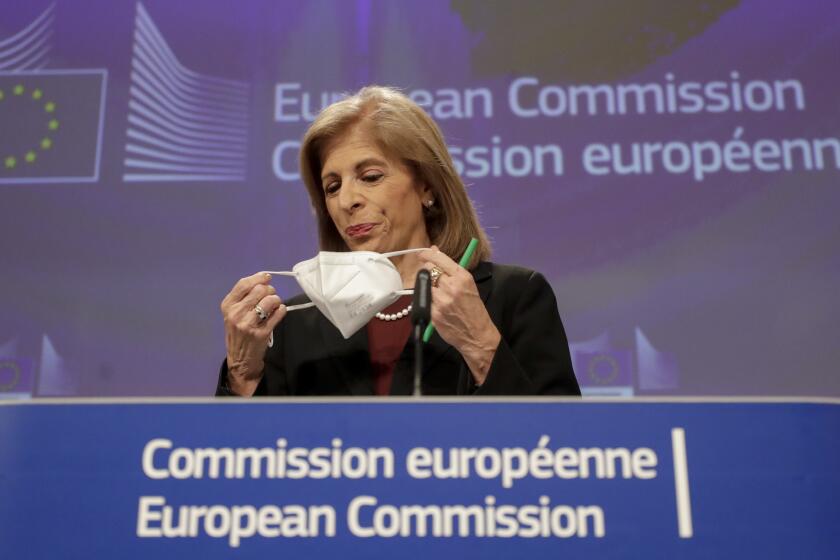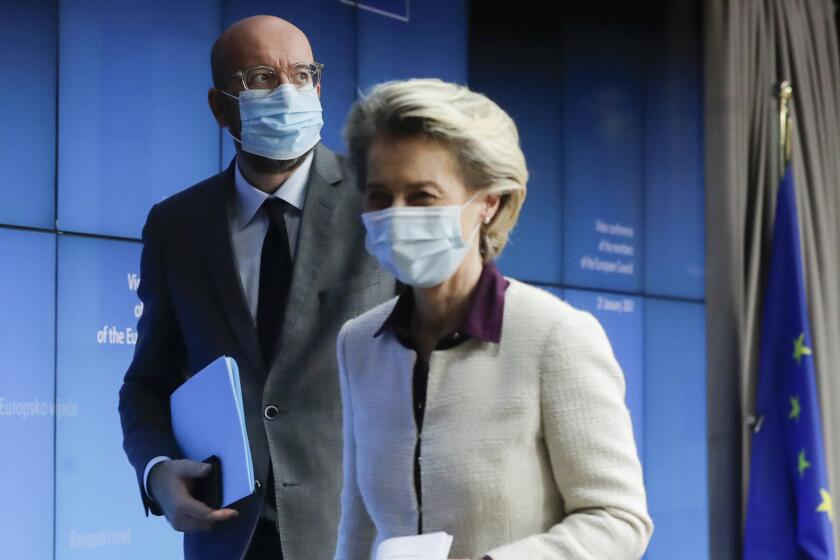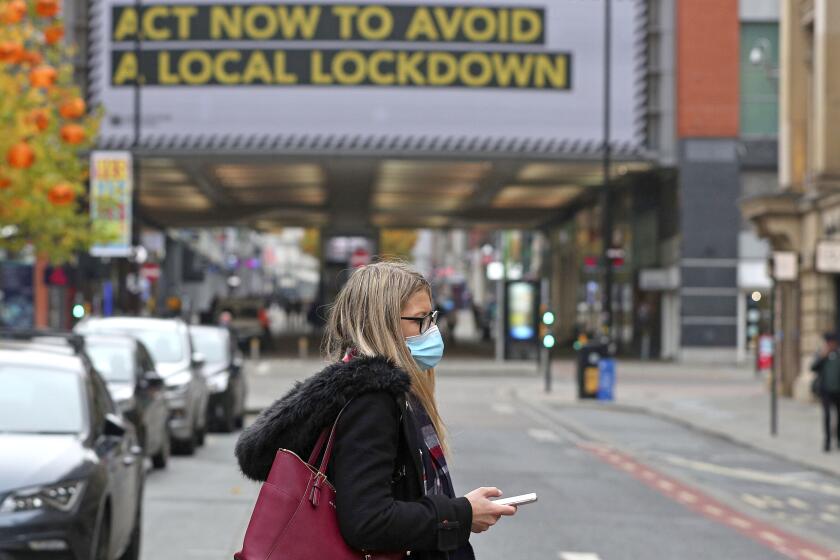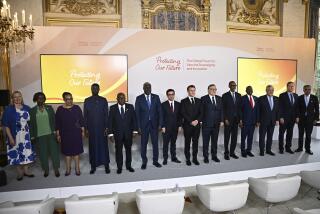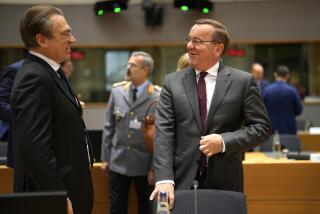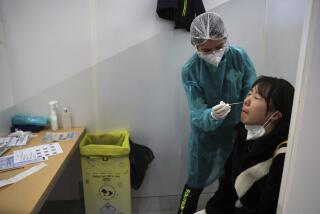Europe’s COVID-19 vaccines are in short supply — but not the blame for their slow rollout
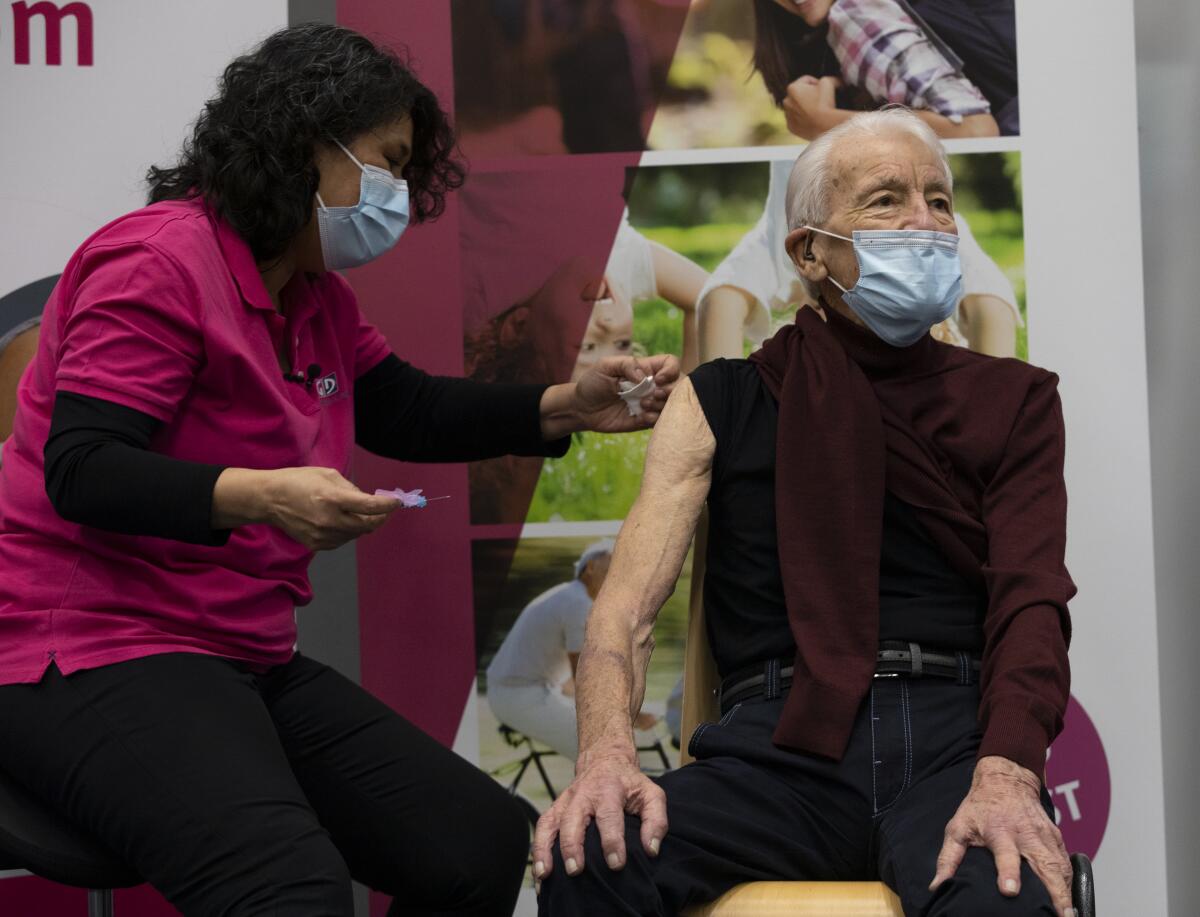
- Share via
APELDOORN, Netherlands — Jos Bieleveldt, a 91-year-old Dutchman, had a spring in his step after getting a COVID-19 vaccination this week. But many think it was way too long in coming.
Almost two months earlier, Britain’s Margaret Keenan, who is also 91 now, received her shot to kick off the U.K.’s mass-inoculation campaign, which has so far outstripped the efforts of the 27-nation European Union.
“We are dependent on what the European Commission says we can and cannot do,” Bieleveldt said of the executive arm of the EU. “As a result, we are at the bottom of the list. It takes far too long.”
The commission, perhaps unfairly, has taken the brunt of criticism for the slow vaccination rollout in many EU member states. Onerous regulations and paperwork in some countries and poor planning in others have also contributed to the delay, as did a more deliberate authorization process for the shots.
Overall, the EU, a club of many of the world’s richest nations — most with universal healthcare, to boot — is not faring well in comparison to countries such as Israel and Britain. Even the U.S., where tens of thousands of appointments for shots have been canceled because of vaccine shortages, appears to be moving faster.
Israel has given at least one shot of a two-dose vaccine to more than 40% of its population. In Britain, the figure is 10%. In the EU: just over 2%.
The European Union’s dispute with AstraZeneca has intensified, with the drugmaker denying it had pulled out of talks on COVID-19 vaccine supplies.
It’s not just EU citizens who are laying the blame at the bloc’s door. Criticism is also coming from many nations that had hoped to receive some vaccine doses from the EU amid concerns that richer nations are snapping up far more doses than they need, leaving poorer nations to do without.
“Today it’s harder to get the vaccines than nuclear weapons,” said Serb President Aleksandar Vucic, who had been counting on a lot more help from the EU.
Serbia sits at the heart of the Balkan region where the EU, Russia and even China are seeking a stronger foothold. Helping the Balkan countries with their vaccine rollout seemed an area where Europe, with its medical prowess and a willingness to prioritize such cooperation, would have an edge.
Not so far.
Vucic said weeks ago when he welcomed 1 million doses of Chinese vaccines that Serbia had not received “a single dose” from the global Covax system aimed at getting affordable shots to poor and middle-income countries. The EU has championed and funded Covax.
Instead, Vucic said Serbia secured vaccines through deals with individual countries or producers.
“The world today is like [the] Titanic. The rich tried to get the lifeboats only for themselves ... and leave the rest,” Vucic said.
Other nations on the EU’s southeastern rim have also been critical.
The European Union is pressing AstraZeneca to deliver more COVID-19 vaccines as it lags behind countries including the U.S. in inoculating its residents.
It is a big turnaround from only a month ago when the EU’s future looked pretty bright. It had just inked a last-minute trade deal with Britain, which formally left the EU a year ago; clinched a massive $2.2-trillion coronavirus relief and overall budget deal; and started rolling out its first COVID-19 vaccines.
“This is a very good way to end this difficult year and to finally start turning the page on COVID-19,” EU Commission President Ursula von der Leyen said at the time.
By last weekend, though, her attitude soured as it became clear that the bloc would be getting vaccines at a slower rate than agreed upon for its 450 million people.
AstraZeneca has told the EU that, of its initial promised batch of 80 million, only 31 million would immediately be delivered once its vaccine was approved by the EU’s medicines regulator, which is likely to happen Friday. That came on the heels of a smaller glitch in deliveries to the EU of Pfizer-BioNTech shots.
Both companies say they are facing operational issues at plants that are temporarily delaying the rollout.
Britain becomes the first country to approve a fully tested COVID-19 vaccine, but its show of national pride raises EU hackles.
Italy is threatening to take legal action against both over the delay. Italian Prime Minister Giuseppe Conte had been boasting that the country’s rollout was a huge success, especially when the millionth dose was given Jan. 15. But after Pfizer announced the temporary reduction in supply, Italy slowed from administering about 80,000 doses a day to fewer than 30,000.
Bulgaria has also criticized the drug companies, and some there have called for the government to turn to Russia and China for vaccines.
Hungary is already doing so. “If vaccines aren’t coming from Brussels, we must obtain them from elsewhere. One cannot allow Hungarians to die simply because Brussels is too slow in procuring vaccines,” Prime Minister Viktor Orban said, adding a line attributed to former Chinese paramount leader Deng Xiaoping: “It doesn’t matter whether the cat is black or white, as long as it catches mice.”
Supply isn’t the only thing holding up the EU’s vaccination campaign. Part of the problem is that the EU Commission bet on the wrong horse and didn’t order enough doses of vaccines, such as the one developed by Pfizer and BioNTech, that showed early signs of success. The commission points out that there was no way of knowing which vaccine candidates would succeed or which would be first, and so it had to spread out its orders over several companies.
The EU rollout was also slowed because the European Medicines Agency took more time than the U.S. or U.K. regulators to authorize its first vaccine. That was by design as it strove to ensure that member nations could not be held liable in case of problems and to give people more confidence that the shot was safe.
Individual countries also share in the blame.
Germany, usually held up as the model of an organized and orderly nation, has been found sorely wanting. Its rollout has been marred by chaotic bureaucracy and technological failures, such as those seen Monday when thousands of people over 80 in the country’s biggest state were told they would have to wait until Feb. 8 to get their first shots.
“The speed of our action leaves a lot to be desired,” Chancellor Angela Merkel said. “Processes have often become very bureaucratic and take a long time, so we have to work on that.”
It is no different in France, where there is a cumbersome maze of rules to get consent for vaccinating the elderly.
In the Netherlands, which banked on the easy-to-handle AstraZeneca vaccine being the first available, authorities have had to scramble to make new plans for the Pfizer-BioNTech vaccine, whose ultra-cold storage requirements make it more complicated.
“We were proven to be insufficiently flexible to make the change,” said Health Minister Hugo de Jonge.
The Dutch have been particularly criticized since they were the last in the EU to begin vaccinations, more than a week after the first shots were given elsewhere in the bloc, and they have been especially slow to roll out doses to older people living at home like Bieleveldt, a retiree.
“I’m already playing in injury time in terms of my age,” he said. “But I still want to play for a few more years.”
More to Read
Sign up for Essential California
The most important California stories and recommendations in your inbox every morning.
You may occasionally receive promotional content from the Los Angeles Times.
